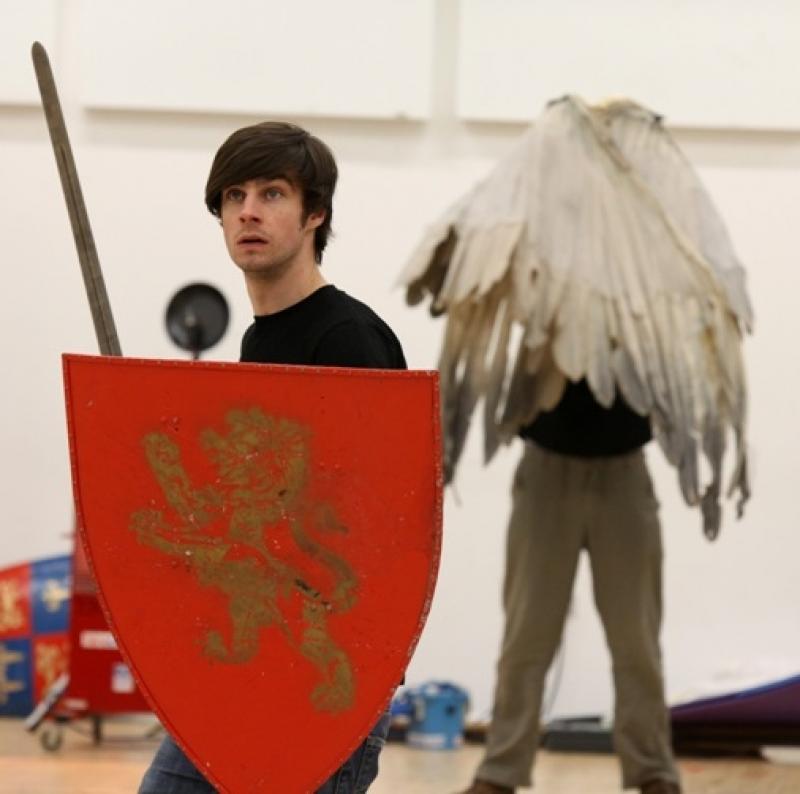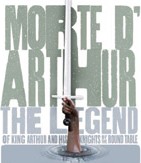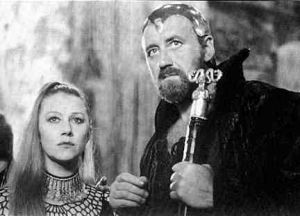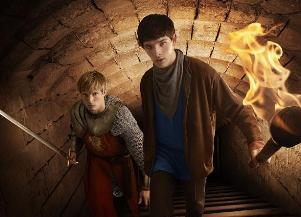The Epic of England: Adapting Morte d'Arthur | reviews, news & interviews
The Epic of England: Adapting Morte d'Arthur
The Epic of England: Adapting Morte d'Arthur
Mike Poulton on the challenge of rewriting Malory's epic for the stage

The RSC’s Morte d’Arthur is not what you’d call a rushed job. John Barton, the company’s advisory director, has been on a mission to see the work performed for at least 50 years. The director Greg Doran had also been wanting to stage Malory’s epic for many years. He asked me to produce a version when we were working together on the York Mystery Plays in the Minster, to mark the Millennium. We’ve been putting it together ever since, and now it's finally opening.
 All things Arthurian are very popular in this country. The myth of Arthur has a potency. This is, after all, the epic of England. It is our epic. It’s the kernel of all our culture up to that point - an amazing box of magic and literary tricks and you can do anything with it. Everything’s there. It’s fun to work with because there’s so much to choose from.
All things Arthurian are very popular in this country. The myth of Arthur has a potency. This is, after all, the epic of England. It is our epic. It’s the kernel of all our culture up to that point - an amazing box of magic and literary tricks and you can do anything with it. Everything’s there. It’s fun to work with because there’s so much to choose from.
The Morte d’Arthur was, I’m sure, Shakespeare’s bedtime reading and he uses many scenes and themes in his own plays. As a young man Milton tried to write an orderly version of Morte d’Arthur but failed because he couldn’t make sense of the material, or forge it into a coherent tale. Every author who ever approached Malory has had to select what he needed for his own purposes. And so it continues. My starting point was to absorb Malory’s cauldron of ideas, a lot of them contradictory, as Malory takes on the style and tone of the very varied mass of Arthurian romance already in existence.
I read what is a very long book carefully and began to make detailed notes. Soon my notes were becoming considerably longer than the original text. About a third of the way through, Derek Jacobi gave me a talking book version of Morte d’Arthur that he’d recorded. It was only about half the original text, and was seven hours long.
I n the process of working through the entire text, we found all sorts of surprising, unfamiliar incidents, that we were able to highlight on the stage. For example, the Merlin you will see on stage will be nothing like the Merlin in Excalibur (pictured left: Nicol Williamson as Merlin with Helen Mirren as Guinevere), or in the current crop of TV series (pictured below right, Colin Morgan as Merlin with Bradley James as Arthur in the BBC series). Lucifer himself puts in an appearance, and who would have thought that Arthur would choose Herod the Great as his political mentor?
n the process of working through the entire text, we found all sorts of surprising, unfamiliar incidents, that we were able to highlight on the stage. For example, the Merlin you will see on stage will be nothing like the Merlin in Excalibur (pictured left: Nicol Williamson as Merlin with Helen Mirren as Guinevere), or in the current crop of TV series (pictured below right, Colin Morgan as Merlin with Bradley James as Arthur in the BBC series). Lucifer himself puts in an appearance, and who would have thought that Arthur would choose Herod the Great as his political mentor?
Originally we toyed with the idea of making a two-night version as we had with the RSC’s production of The Canterbury Tales in 2005, but eventually we decided to produce a single play with three very different acts. The first starts with the mythic and magical side of Arthur - encounters with necromancers, demi-devils and monsters lurking in the dark forests on the edge of a Christian world. The second act is the tales of Arthur’s Knights, culminating in the quest for the Holy Grail, as worldly ambition gives way to a deep longing for spiritual fulfilment.
 The third act is like an early Shakespeare History play. What came into my mind was John Barton’s Wars of the Roses – which, as a mere infant, was the first thing I ever saw in Stratford. There is a lot more dialogue in the last two books of Morte d’Arthur and these are Shakespearean in their scope. So I started with the last two books of the Morte d’Arthur, and for the first two acts selected material that served what becomes the play’s climax – the resolution of Arthur’s story and that of Launcelot and Guenever. The play attempts, in a way, to show how myth transforms itself into history.
The third act is like an early Shakespeare History play. What came into my mind was John Barton’s Wars of the Roses – which, as a mere infant, was the first thing I ever saw in Stratford. There is a lot more dialogue in the last two books of Morte d’Arthur and these are Shakespearean in their scope. So I started with the last two books of the Morte d’Arthur, and for the first two acts selected material that served what becomes the play’s climax – the resolution of Arthur’s story and that of Launcelot and Guenever. The play attempts, in a way, to show how myth transforms itself into history.
Malory was writing at a time when the Wars of the Roses were in full swing. Caxton published the book in 1485, the year of the Battle of Bosworth. Mordred’s armies at the end of the book are clearly Yorkist armies and Arthur, like Malory, is clearly a Lancastrian. Malory is imposing the history of the Wars of the Roses onto his material. To me, this makes the story really coherent. Yes, it’s the process by which myth becomes history – but the Morte d’Arthur recognises too that, in a way, we don’t want it to. We need the fantasy. We want to believe that Arthur is asleep under the hill and that when things get really desperate he’ll come and form a new government we can believe in. We want to believe that the Holy Grail was here on Earth for a time before a mysterious hand came down and lifted it up into heaven. We want to believe that Excalibur is lying at the bottom of a lake near Avilion.
Explore topics
Share this article
The future of Arts Journalism
You can stop theartsdesk.com closing!
We urgently need financing to survive. Our fundraising drive has thus far raised £49,000 but we need to reach £100,000 or we will be forced to close. Please contribute here: https://gofund.me/c3f6033d
And if you can forward this information to anyone who might assist, we’d be grateful.

Subscribe to theartsdesk.com
Thank you for continuing to read our work on theartsdesk.com. For unlimited access to every article in its entirety, including our archive of more than 15,000 pieces, we're asking for £5 per month or £40 per year. We feel it's a very good deal, and hope you do too.
To take a subscription now simply click here.
And if you're looking for that extra gift for a friend or family member, why not treat them to a theartsdesk.com gift subscription?
more Theatre
 The Weir, Harold Pinter Theatre review - evasive fantasy, bleak truth and possible community
Three outstanding performances in Conor McPherson’s atmospheric five-hander
The Weir, Harold Pinter Theatre review - evasive fantasy, bleak truth and possible community
Three outstanding performances in Conor McPherson’s atmospheric five-hander
 Dracula, Lyric Hammersmith review - hit-and-miss recasting of the familiar story as feminist diatribe
Morgan Lloyd Malcolm's version puts Mina Harkness centre-stage
Dracula, Lyric Hammersmith review - hit-and-miss recasting of the familiar story as feminist diatribe
Morgan Lloyd Malcolm's version puts Mina Harkness centre-stage
 The Code, Southwark Playhouse Elephant review - superbly cast, resonant play about the price of fame in Hollywood
Tracie Bennett is outstanding as a ribald, riotous Tallulah Bankhead
The Code, Southwark Playhouse Elephant review - superbly cast, resonant play about the price of fame in Hollywood
Tracie Bennett is outstanding as a ribald, riotous Tallulah Bankhead
 Reunion, Kiln Theatre review - a stormy night in every sense
Beautifully acted, but desperately grim drama
Reunion, Kiln Theatre review - a stormy night in every sense
Beautifully acted, but desperately grim drama
 The Lady from the Sea, Bridge Theatre review - flashes of brilliance
Simon Stone refashions Ibsen in his own high-octane image
The Lady from the Sea, Bridge Theatre review - flashes of brilliance
Simon Stone refashions Ibsen in his own high-octane image
 Romans: A Novel, Almeida Theatre review - a uniquely extraordinary work
Alice Birch’s wildly epic family drama is both mind-blowing and exasperating
Romans: A Novel, Almeida Theatre review - a uniquely extraordinary work
Alice Birch’s wildly epic family drama is both mind-blowing and exasperating
 The Producers, Garrick Theatre review - Ve haf vays of making you laugh
You probably know what's coming, but it's such great fun!
The Producers, Garrick Theatre review - Ve haf vays of making you laugh
You probably know what's coming, but it's such great fun!
 Not Your Superwoman, Bush Theatre review - powerful tribute to the plight and perseverance of Black women
Golda Rosheuvel and Letitia Wright excel in a super new play
Not Your Superwoman, Bush Theatre review - powerful tribute to the plight and perseverance of Black women
Golda Rosheuvel and Letitia Wright excel in a super new play
 Cow | Deer, Royal Court review - paradox-rich account of non-human life
Experimental work about nature led by Katie Mitchell is both extraordinary and banal
Cow | Deer, Royal Court review - paradox-rich account of non-human life
Experimental work about nature led by Katie Mitchell is both extraordinary and banal
 Deaf Republic, Royal Court review - beautiful images, shame about the words
Staging of Ukrainian-American Ilya Kaminsky’s anti-war poems is too meta-theatrical
Deaf Republic, Royal Court review - beautiful images, shame about the words
Staging of Ukrainian-American Ilya Kaminsky’s anti-war poems is too meta-theatrical
 Laura Benanti: Nobody Cares, Underbelly Boulevard Soho review - Tony winner makes charming, cheeky London debut
Broadway's acclaimed Cinderella, Louise, and Amalia reaches Soho for a welcome one-night stand
Laura Benanti: Nobody Cares, Underbelly Boulevard Soho review - Tony winner makes charming, cheeky London debut
Broadway's acclaimed Cinderella, Louise, and Amalia reaches Soho for a welcome one-night stand
 The Pitchfork Disney, King's Head Theatre review - blazing with dark energy
Thrilling revival of Philip Ridley’s cult classic confirms its legendary status
The Pitchfork Disney, King's Head Theatre review - blazing with dark energy
Thrilling revival of Philip Ridley’s cult classic confirms its legendary status

Add comment